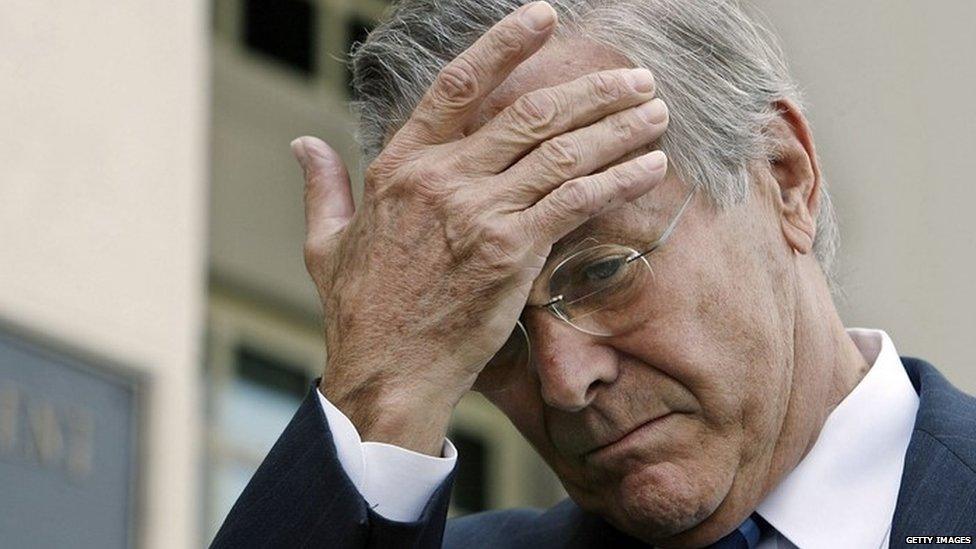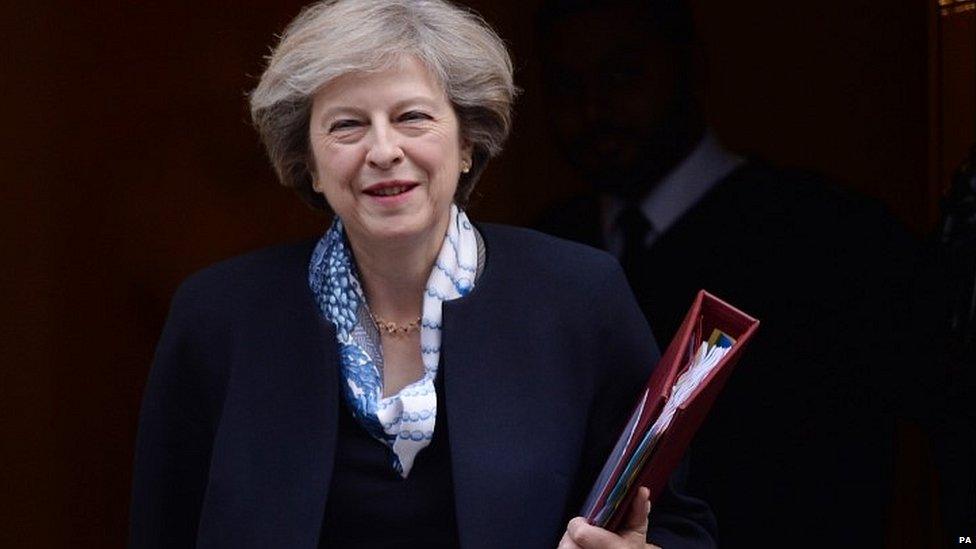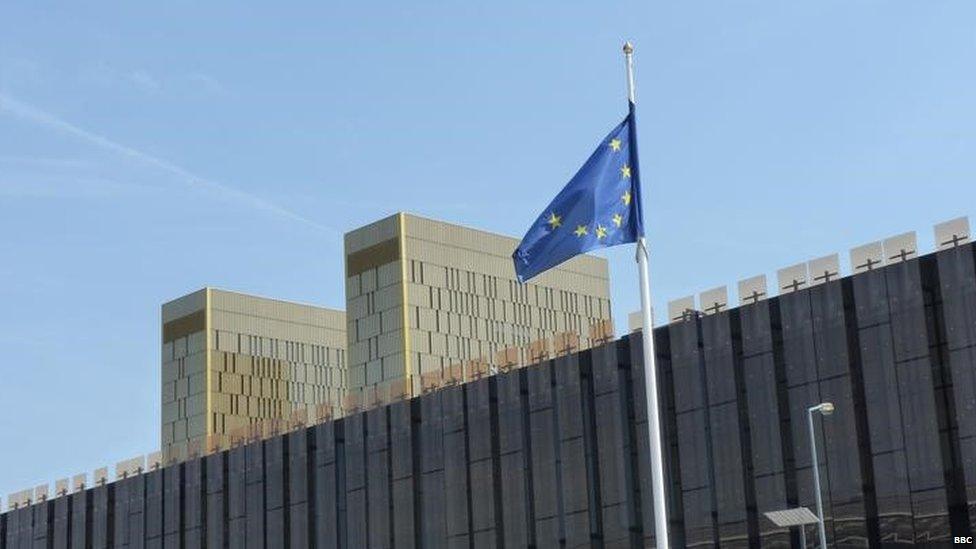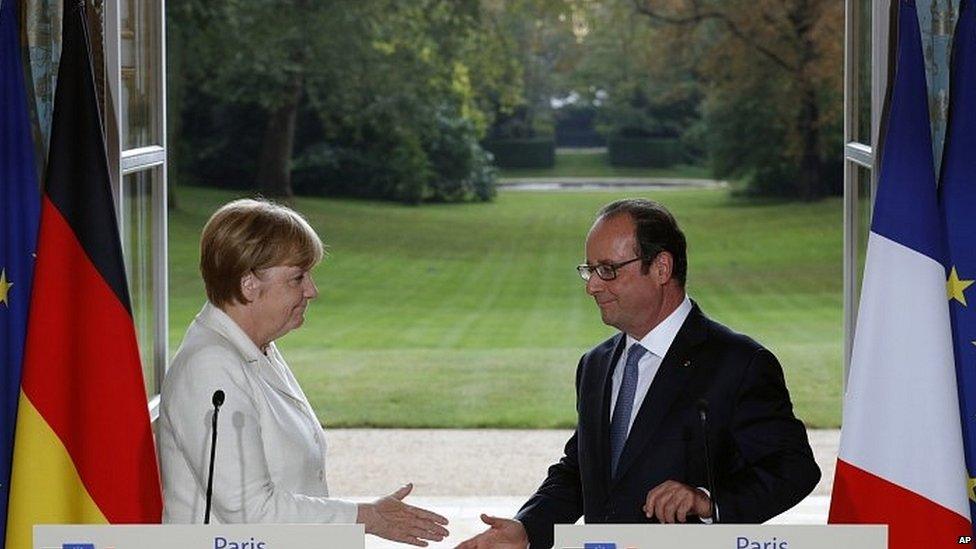What do we know about Brexit?
- Published

Donald Rumsfeld's paean to political uncertainty has a certain resonance today
What do we know?
One of the most baffling political quotes of all time was the former American Defence Secretary, Donald Rumsfeld's response to questions about weapons intelligence on Iraq back in 2002.
He was lampooned at the time, but in the months and years that followed, his bizarre syntax became rather a shorthand for a situation so complicated and fluid that it is almost impossible to rule anything in or out.
Just in case you had forgotten - and you can watch it here , external- here is how he put it at the time.
"There are known knowns. These are things we know that we know. There are known unknowns. That is to say, there are things that we know we don't know. But there are also unknown unknowns. There are things we don't know we don't know."
Of course the situation in respect of Brexit is different indeed, very very different.
But I can't help thinking of that quote as right now, we hear government ministers trying, or indeed not trying to give MPs full answers on their plans for Brexit that there are indeed known knowns but also many more known unknowns
And indeed, that there are probably unknown unknowns about how we extricate ourselves from the EU, what our relationship with the rest of the EU looks like, and indeed the rest of the world.
Frankly, we know almost as little about the plan for Brexit that's concrete as we did that momentous morning after the referendum itself.
But there have been plenty of hints, implications and suggestions of priorities that are worth noting, even if just to reveal how much that we can't be sure of. It is not by any stretch an exhaustive list, and without concrete proposals, everything is still open to interpretation.
Immigration
First off, on immigration, which came to dominate the referendum debate.
Theresa May evidently believes, whatever else we end up with, that the British government needs to have more say over how many people come to live here from the rest of the European Union.
She's ruled out a points system to determine who gets in and who doesn't, even though we use elements of that to control the numbers of people who move here from other parts of the world. There are plenty of suggestions floating around the place over what a new system might be - for example a work permit system as put forward by the former Cabinet Minister Iain Duncan Smith.

Mrs May has suggested any settlement must give the UK control of EU immigration
Under this option, students, tourists, and people being transferred by their employer for work (known as intra company transfers) can come here without limit, but others must have a job offer before they arrive. But people with particular skills, scientists for example, could be exempt from control altogether.
Other ideas have been put forward, regional visas for example by the London Mayor Sadiq Khan.
In truth, there isn't a clear position from the government yet, but a clear determination that when we get to the end of the Brexit process, there is a political imperative for Theresa May to be able to say she is able to exert more control over the levels of European immigration.
Single market
That is what makes the second fiendish issue so politically difficult. Is the government going to try to keep our full membership of the single market - the European Union's giant free trade area where businesses can deal with companies right around the union, with a market of 500 million people, without any obstacles.
During the referendum campaign, Vote Leave said that we would indeed leave the single market. Other EU countries have said that we can't stay in the single market if we are intent on restricting European immigration.
It's not just a real, but a philosophical point - for the EU single market, countries accept four 'freedoms' - goods, services, people and capital - basically cash, trade and people.
So in theory, if we want to control immigration from the EU, we can't stay inside.
But, so far ministers hedge around this. In fact three different cabinet ministers have told me they believe that we might keep our membership of the single market if British negotiators can find a cunning wheeze, a way round it.
Others believe it is helplessly optimistic to believe that's possible, other ministers suggest it's not even desirable and we'd be better off trying to go it alone within the rules of the World Trade Organisation.

The government intends to end the European Court of Justice's jurisdiction in the UK
Again, the government just hasn't made its position clear. Theresa May is the kind of politician who genuinely wants to look at all the evidence, even if there is swathes of it, before making a decision.
And it's worth remembering this is not as binary as it sounds. Being a member of the single market is not like being a member of the AA or the local gym - you don't just stop paying your direct debit and cut up your membership card.
There are lots of different models like the deal Norway has, or Switzerland, that allow it to trade with varying expectations of how many of the rules they have to obey.
But more to the point, while most EU leaders seem implacably opposed to the UK following Boris Johnson's oft-quoted aspiration of "having its cake and eating it" - keeping all the goodies of the single market and getting more control on immigration - it is always worth remembering that although there are EU regulations and precedents, as one senior Conservative put it, 'there is literally nothing that is unchangeable about the EU if the political leaders want it".
Political leadership
In this instance, that is a huge if, but it'd be wrong to think that anything about the government's attitude to the single market has been set in stone, and importantly in the next twelve months, many European leaders risk losing their perches in their own elections. They could be replaced by others who are more sympathetic to the UK's case, or in reverse, far more willing to be punitive.
But it is also well worth remembering that the UK has over the years managed to exclude itself from some of the biggest EU projects - the single currency and the Schengen border free travel zone.

Elections in Germany and France next year could usher in new political leadership in Europe
What about the cash we have to stump up? Ministers have been oh so careful not to rule out having to contribute anything to the EU, even after we leave, despite the promises of the Vote Leave campaign that we'd get billions back.
You might argue that voters, and certainly many Tory MPs will be furious if under the deal we end up shelling out. But it is a very real possibility that ministers may end up pursuing a deal where we would continue to pay a certain amount to Brussels in return for a trading relationship.
It's another known unknown. Equally we know that ministers would rather be able to allow all EU nationals currently living here to stay.
But they are miles from committing to that, insistent, rightly or wrongly, that they will only give that guarantee if British citizens who live in EU countries are given the same, racking up something else we are yet to know.
So far, I'm afraid, so unclear. There are a few issues however that are clear as crystal. It's unambiguous, that the prime minister is intent on taking us out of the jurisdiction of the European Court of Justice (ECJ).
This was one of the clues that suggests we'll leave the single market, as the ECJ polices its rules. But then again, Norway is in the market, but is not under the Court, even though its equivalent authority takes much of its guidance from the ECJ.
Nudges and hints
The European Courts will no longer be the ultimate arbiter of our laws once we have left the EU. Under the Great Repeal Bill, which will be discussed and voted on in Parliament next year, at the moment we leave, all EU laws go into British law. And then, our MPs can, as they see fit, unpick them, replace them, or scrap them one by one.
And as David Davis told MPs today, there'll be no possibility of veto, that Brexit means Brexit and we will be leaving the European Union.
And very few of the MPs who today so passionately pleaded for more say over how our departure unfolds, would now argue to unpick the result.
There are already countless interpretations of all the above, other readings of the nudges and hints we've had from central government.
And there are so many other factors in all of this - what happens about the Customs Union, what happens about EU structural funds, what happens to the Northern Irish border, what happens to benefits paid to expats, the list goes on and and on and you guessed it, most of the items on the list are, yes, known unknowns.
And as Mr Rumsfeld suggested all those years ago, there are indeed, unknown unknowns. We are only at the very beginning of a process that is going to take years, not months, that will change our relationship with the rest of the continent, and ultimately the rest of the world.
There may well be consequences that right now, we can't even imagine, for good or for ill. Right now, there is very little that we can be sure of - the government is yet to come to a concrete position on what it wants to achieve.
And even when ministers can agree on their specific aims, that's when the rest of the EU will start to grapple with the detail of a process. The British government reaching its own conclusions is only perhaps the start.